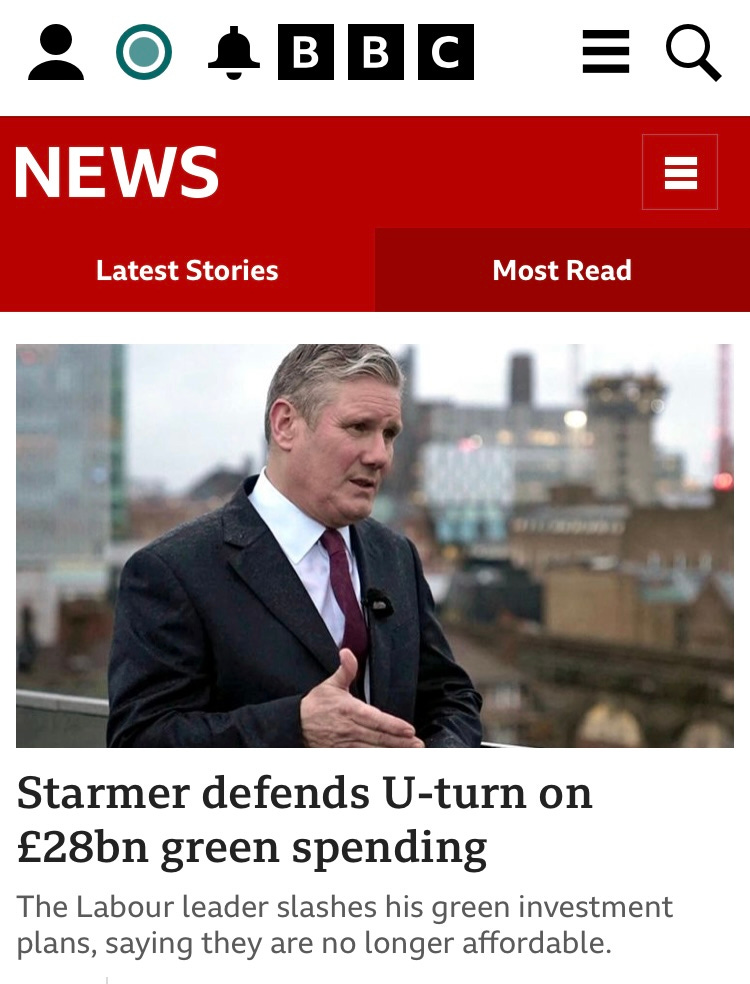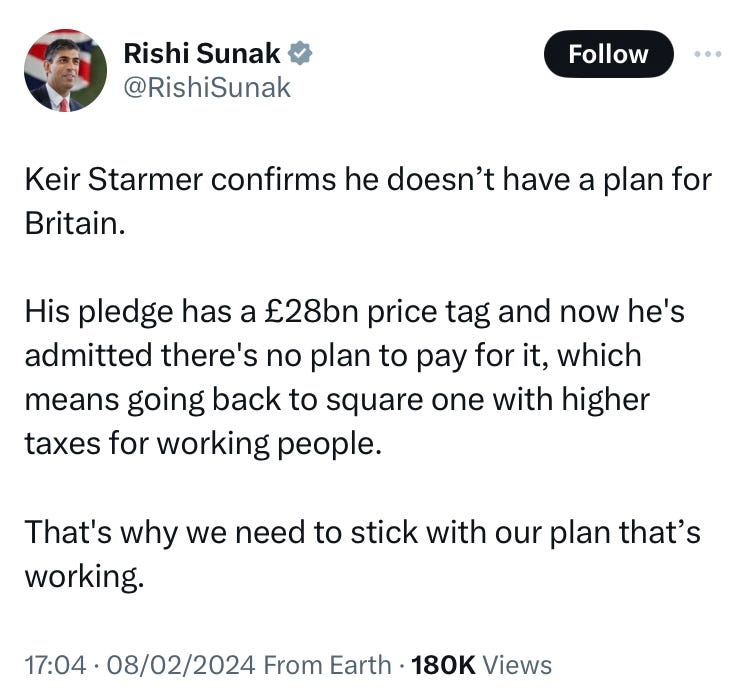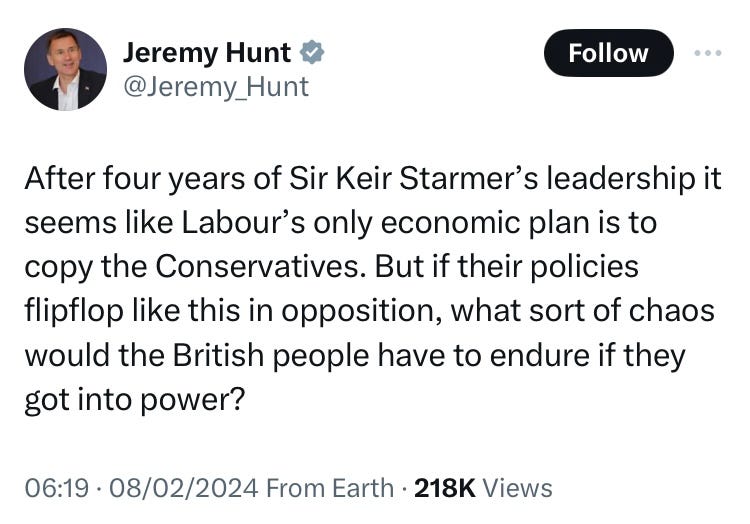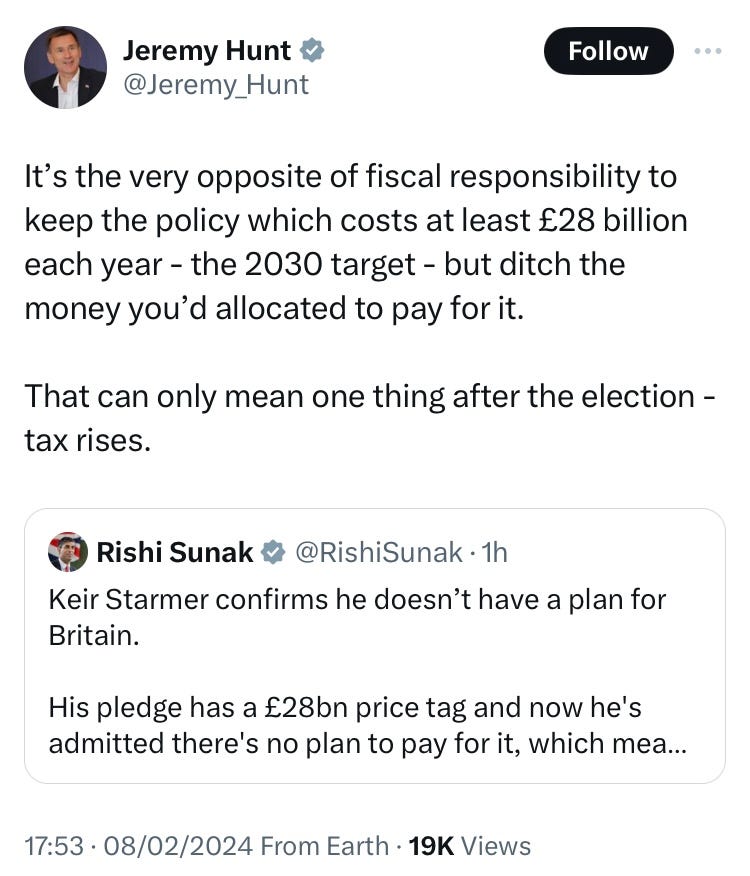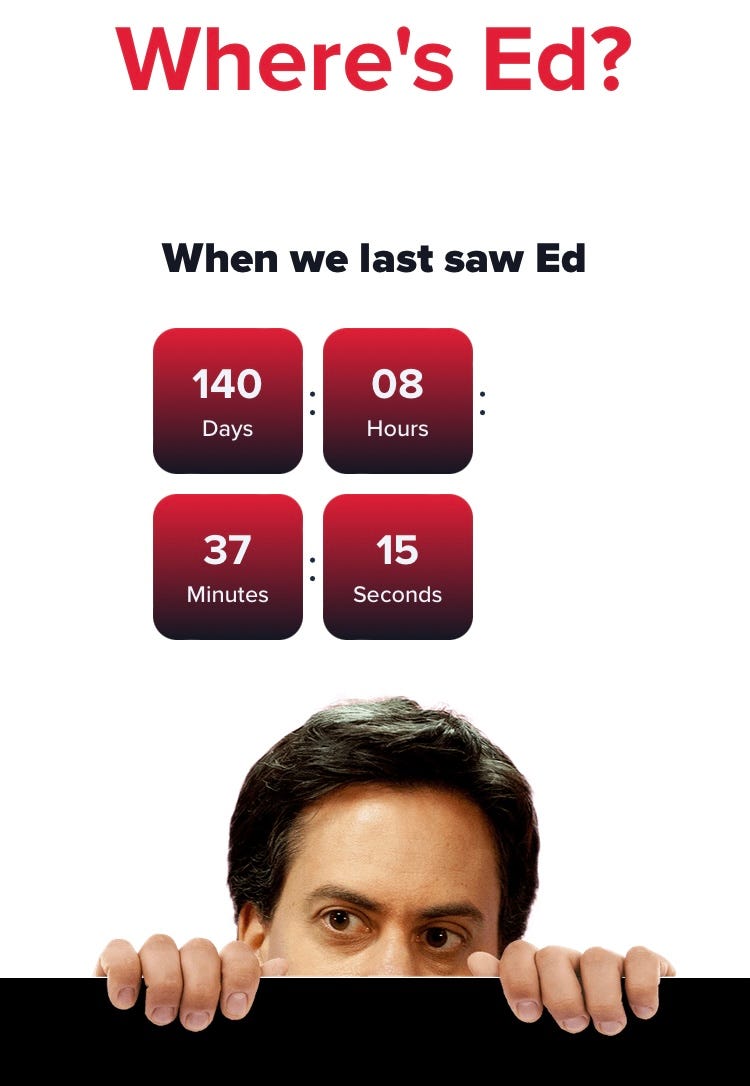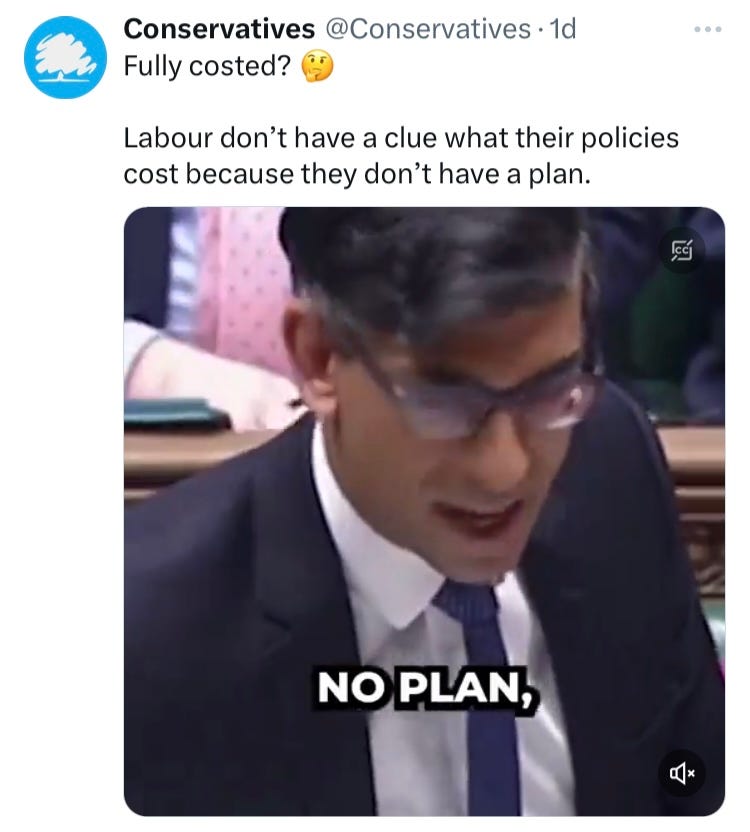Getting your ducks in a row
Labour’s u-turn isn’t easy to defend. But if the Tory response is anything to go by, it isn’t easy to attack either.
If there’s one thing we can definitively say about what Labour has done today, it’s that they have u-turned. That’s not controversial. Their position until today was to spend, by the end of the next parliament, £28 billion per year on green investment. Their position now is not to do that, and to spend far less: around £4.7 billion per year.1 The BBC is reporting this as a u-turn, which is fair enough.
So what’s Rishi Sunak’s line? It’s that… there isn’t a u-turn. Labour is still going to spend £28 billion per year. Here’s the tweet:
This puts Sunak at odds with his Chancellor, Jeremy Hunt, whose line this morning was that Labour’s policy has indeed changed. Following what Hunt calls a “flipflop”, “Labour’s only economic plan is to follow the Conservatives”:
There are many things you could say about a Labour economic plan to follow the Conservatives, and most of them start with pointing at the state of the economy under the Conservatives, but if you’re a Conservative Chancellor this option isn’t really open to you. Hunt is saying that Labour’s economic policy used to be bad, but that now it’s the same as his. This position is, to put it mildly, not a great base from which to launch Conservative economic attacks.
Someone seems to have noticed this, and had a word. Hunt’s line has changed.2 Now, Labour’s policy is not the same as the Conservatives’ policy after all. It is still to spend £28 billion per year, but not to say so any more, and to raise taxes instead. Labour has a secret plan to keep spending the money it said today it wasn’t going to spend, and to raise taxes to do so:
The problem with this is its basic political implausibility. If Labour cannot do something without raising taxes by £28 billion, then Labour cannot do something.3 It is perfectly obvious - especially, frankly, under this Labour leadership - that if an aspiration requires tax rises of that order of magnitude, then that aspiration is simply not going to be met. You can go with “they won’t do this thing they want to do, because they can’t afford to”, or you can go with “they are going to do this thing they want to do and raise your taxes to pay for it”. You can attack the lack of ambition or you can attack the tax-raising, because those are the two alternatives. Lack of ambition is, broadly speaking, a left critique that passes the plausibility test whether you wish they were more ambitious or not. Tax-raising on this kind of scale is, broadly speaking, a right critique that relies on just ignoring everything we know about political reality and Rachel Reeves.
Anyway, “this is not a u-turn” is the Tory line to take, as witnessed by Laura Trott, Chief Secretary to the Treasury and her party’s designated sayer-of-any-old-contradictory-nonsense,4 on the BBC’s PM programme this evening.
Laura Trott: Well Evan they can’t even do a u-turn properly, because what Keir Starmer has confirmed today, that they’re still committed to all the policies in their 2030 energy plan and that means as they’ve said numerous times that that costs £28 billion, so all they have confirmed today is that they do not have a plan to pay for it, which means higher taxes on working people, and it means that…
Evan Davis: Hang on, so they haven’t made a u-turn, you’re saying?
Laura Trott: They, they haven’t even u-turned properly, this is what’s so extraordinary about the situation.
Evan Davis: But I thought actually they have u-turned, they’ve assigned a budget, this is what we’re going to spend, and obviously, if we get fewer homes for example insulated in the money we’ve allocated, well then the money’s been allocated, we can’t do as many homes as we’d like, it’s not that they’re going to spend the money that you now say they’re going to spend, they’re not going to spend that money.
Laura Trott: They literally say, and I’m reading from their press release here, they’ve reconfirmed the commitment to the policies announced.
Evan Davis: But that didn’t add up to £28 billion, because the £28 billion was giving you a lot more than just the announced policies.
Laura Trott: No, no it wasn’t, that was how much they said the package of policies were going to cost.
Evan Davis: No way!
On a matter of pure policy, Evan Davis is just right here.5 But the Tory line is clear. The BBC is wrong. It’s not a u-turn.
All of which brings us to the strange case of CCHQ and their attacks on Ed Miliband. Miliband was, famously, one of the biggest champions inside the Labour Party of the Green Prosperity Plan, for the two reasons that a) he agreed with it; and b) it was, in large part, his budget. The Tories have been having fun with Ed Miliband today, because Rachel Reeves and Keir Starmer have taken his budget away. Ed, the Tories say, must be sad:
They’ve even put together a quick and dirty “Where’s Ed?” website, counting how long it’s been since they last saw him:
One obvious flaw in this is that 140 days is on no reasonable definition the time since Ed Miliband’s most recent public appearance: his speech to Labour Party Conference was 122 days ago; he last spoke in the Commons in late January; the latest episode of his podcast came out on Monday. It is possible that nobody in CCHQ has seen Ed Miliband for 140 days, but it is not obvious why their failure to keep tabs on a public figure whose activities they are literally paid to follow is anyone else’s problem.6
But there’s a bigger flaw. Why is Ed sad? Why is Ed hiding? Because he has been humiliated. How has he been humiliated? By having his policy taken away from under him. How has it been taken away? Well, he was going to have £28 billion a year to spend on green infrastructure, and now… wait a minute. Rishi Sunak’s line, and Jeremy Hunt’s oops-I’m-sorry-ignore-my-previous-tweet reverse ferret line, and Laura Trott’s line, are that he still has £28 billion a year to spend on green infrastructure. That is the entire basis of the “this is not a u-turn” claim. If it’s not a u-turn, Ed Miliband doesn’t need to be sad. If Ed Miliband is sad, it’s a u-turn. I can see why this attack was tempting. But sometimes you have to drop the fun line if it’s the opposite of the line your leader is using. Maybe CCHQ are just a freelance operation now. If so, I hope they’re paid by the tweet.7
Of the two possible lines for the Tories to take on Labour’s u-turn, “this is a u-turn” is more plausible than “this is not a u-turn”, because it is a u-turn. Furthermore, “this is a u-turn” is easier to square with the Tories’ other attack line of choice, which is that Labour does not have a plan.
If Labour has not done a u-turn, and if it has a secret plan to raise your taxes by £28 billion a year and spend them on an itemised list which nobody except Laura Trott can make add up to £28 billion, then it has a plan. It might not be a plan you like, but “Labour has no plan” is not a claim that you won’t like their plan: it’s a claim that there isn’t one.
The Tories have had a bad week, and the u-turn, if it is one (it is one, come on), means that Labour are having a bad week too. Given the Tories’ problems, some have made the argument that Labour should have waited instead of taking the attention off them with today’s announcement. As the saying goes: never interrupt your enemy while he’s making a mistake. But after all, if Labour didn’t interrupt the Tories while they were making a mistake, they wouldn’t have said a word for the last two years.
The latest episode of our podcast The Election Tricycle, in which Emily Tamkin, Rohan Venkat and I talk about this year’s elections in the USA, India and the UK, is now out. This week, we look at corruption and alleged corruption, politically-motivated prosecutions and claims that prosecutions are politically-motivated, and different attitudes to wealthy politicians in our respective countries. You can listen to it, and subscribe to it, on Apple, or on Spotify, or via this Podfollow link.
This has been coming for a while, and I said what I thought about it in an extremely long sentence in the penultimate paragraph of this post in December.
Jeremy Hunt has become quite an endearing figure, in his willingness to say things he thinks, without any reference to whether they’re at all helpful to his own side. See for example his tweet praising Alistair Darling as “One of the great Chancellors, [who will] be remembered for doing the right thing for the country at a time of extraordinary turmoil”, or his admission last night - on the day it was published! - that the official Treasury costing of Labour’s home insulation plans might be wrong.
This is the same problem as the one discussed in my post a few weeks ago with Conservative Party Chairman Ric Holden’s claim that Labour will raise income tax from 20 to 25 per cent. No they won’t. Think about it.
A reminder that on her very first day in the job they made her put her name to a press release attacking Labour for irresponsibly calling for a policy the Chancellor announced himself just days later.
In real life, one of the things the anti-£28 billion camp inside the Labour Party were so frustrated about, as they contemplated ditching the policy, was the fact that they’d announced a spending commitment that didn’t even have all its money allocated. Trott’s position is that they were wrong to be frustrated about this, presumably because their specific allocations added up to £28 billion after all even though they absolutely definitely didn’t.
Genuinely, I would love to know what they think they’re talking about here. If you know, tell me.
This is the only possible justification for making someone do a 311-tweet thread listing quotes from various Labour figures saying they back the £28 billion policy, which merely illlustrates the uncontested fact that the £28 billion policy was Labour’s policy at the time various Labour figures said they backed it. (Someone said it was a 311-tweet thread. I confess I have simply taken their word for it.)


